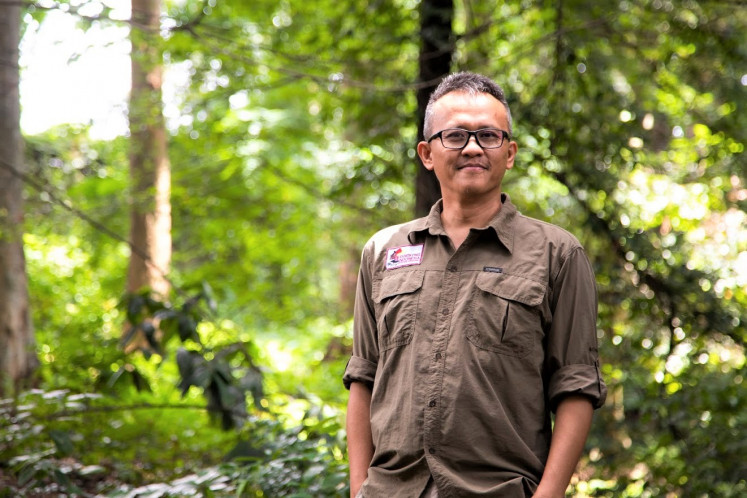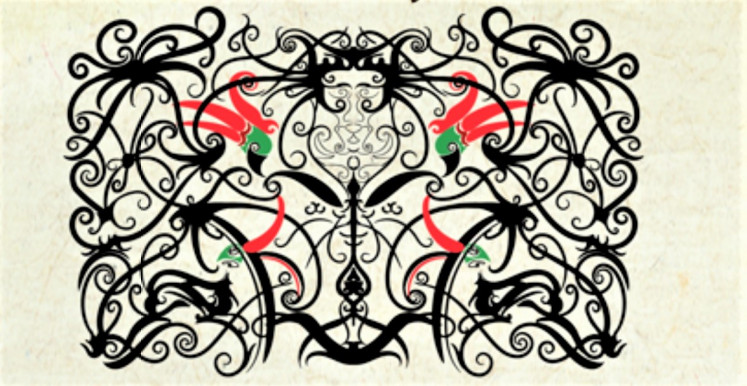Yokyok Hadiprakarsa: Guardian of Indonesia’s endangered helmeted hornbill
The majestic appearance of the helmeted hornbill is also what sees them hunted and killed.
Change Size
 In need of protection: The helmeted hornbill is the most threatened hornbill species in Indonesia. (Courtesy of Yoki Hadiprakarsa/Rangkong Indonesia)
In need of protection: The helmeted hornbill is the most threatened hornbill species in Indonesia. (Courtesy of Yoki Hadiprakarsa/Rangkong Indonesia)
T
he Dayak people of Kalimantan believe that helmeted hornbills are the guardian of life and will guide them to God. They also regard the majestic bird as a symbol of bravery for warriors.
Despite its sacred status, the helmeted hornbills’ solid keratin casque – the stunning red helmet-like protrusion on their beak – is also the main reason they are a profitable target for poachers, who have sold the birds’ heads to collectors, including royalty, for centuries.
Intricate carved ornaments made from their casques and bills have become highly coveted on the international black market, resulting in a sharp rise in hornbill poaching in recent years and making them the most hunted hornbill in the world.
Indonesia is home to 13 of the world’s 62 hornbill species. Three of them – the Sulawesi, knobbed and Sumba hornbill species – are endemic to Indonesia.
In 2013, some 6,000 helmeted hornbills were shot and decapitated in West Kalimantan alone. In Kapuas Hulu regency, a hotspot for poaching, local people kill the birds for economic gain.
In 2015, 2,343 helmeted hornbill beaks were reportedly seized from illegal markets in Indonesia, China and the United States, and following investigations it was learned that all the beaks originated from Indonesia.

Founder and principal investigator for Rangkong Indonesia, or the Indonesia Hornbill Conservation Society, Yokyok “Yoki” Hadiprakarsa plans to turn the table by bringing the world’s attention to the critically endangered birds and in the process save the bird from extinction.
“One of the saddest moments for me was seeing and holding some 300 casques when, in the past 20 years visiting forests throughout Kalimantan and Sumatra, I only saw 24 birds in one tree at the most,” Yoki told The Jakarta Post.
He was named in late April as one of six winners of the prestigious Whitley Awards – often referred to as the “Green Oscars” – which comes with 40,000 pounds (US$50,000) in project funding to allow him to expand his work to protect the critically endangered helmeted hornbill and other hornbills from extinction.
The awards are handed out annually to individuals from the Global South by UK-based conservation charity the Whitley Fund for Nature (WFN).
While the winners, who were selected from 112 applications this year, have already received their funding, the award ceremony scheduled in London has been postponed due to the COVID-19 pandemic.
WFN founder Edward Whitley said in a statement that Yoki’s approach had encouraged people to value a species and its habitat, while allowing them to benefit economically from their area’s rich ecological heritage.
“Yoki’s work shows us that conservation is about people,” he said.
Yoki, who has been involved in conservation for some 20 years, was inspired to take the green path by his idol, the legendary naturalist and broadcaster Sir David Attenborough.
“During my undergraduate research in Sumatra, I heard the maniacal ‘laugh’ of the helmeted hornbill for the first time as it flew over me, and it was love at first sight,” said the 45-year-old from Bogor, West Java, where he lives, or in his words, is “grounded” during the pandemic.
In the past seven years, Yoki said he seen the poaching and illegal trade of helmeted hornbills worsen.
He said there was currently no data to estimate the helmeted hornbill’s population but that ongoing research, conducted for the past two to three years, was expected to come out with the number sometime this year.
“When conducting assessments in Kalimantan and Sumatra, I kept hearing similar stories from people who live near the forests that before 2012, whenever they went to the forests, they would hear or see [the birds], but following widespread poaching after 2013, even after being in the forest for a week, they no longer hear or see them.”

Despite being protected by law, the poaching of hornbills continues, while their natural habitat continues to be destroyed.
The forests provide the hornbills with food and the tree cavities they need to make nests, while in turn hornbills play a role in forest regeneration and protection of the ecosystem by dispersing seeds.
In Indonesia, hornbills are found throughout Sumatra, Java, Kalimantan, Sulawesi and Papua.
With their wide-ranging distribution, Yoki said local communities could benefit from the beauty of the birds by attracting tourists to come and watch the birds in the wild.
To fight poaching, he works closely with communities to provide them with the much-needed skills to earn an income through tourism, with the colorful hornbills as the drawcard.
Yoki believes birdwatching and ecotourism would allow local people to benefit economically from the birds in a humane, sustainable way – ensuring the hornbills are worth more alive than dead.
With his Whitley Award, Yoki will scale up this approach, identifying ecotourism hotspots in the area that are well suited for this conservation model.
He will also develop a five-year ecotourism plan to be applied in three villages, train 100 people in activities such as bird watching, and build capacity among locals to act as forest guardians and monitor hornbills and their nests to prevent poaching.
“The Whitley Award will allow us to continue to inspire communities to become hornbill guardians,” Yoki said.









